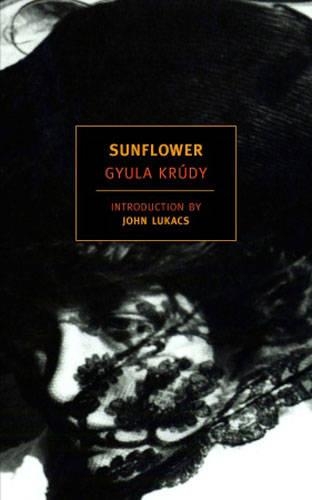
Sunflower
(Paperback, Main)
Publishing Details
Sunflower
By (Author) Gyula Krudy
New York Review Books
NYRB Classics
14th August 2007
11th October 2007
Main
United States
Classifications
General
Fiction
894.511332
Physical Properties
Paperback
272
Width 130mm, Height 205mm, Spine 15mm
273g
Description
Gyula Krudy is a marvelous writer who haunted the taverns of Budapest and lived on its streets while turning out a series of mesmerizing, revelatory novels that are among the masterpieces of modern literature. Krudy conjures up a world that is entirely his own-dreamy, macabre, comic, and erotic-where urbane sophistication can erupt without warning into passion and madness. In Sunflower young Eveline leaves the city and returns to her country estate to escape the memory of her desperate love for the unscrupulous charmer Kalman. There she encounters the melancholy Almos-Dreamer, who is languishing for love of her, and is visited by the bizarre and beautiful Miss Maszkeradi, a woman who is a force of nature. The plot twists and turns; elemental myth mingles with sheer farce: Krudy brilliantly illuminates the shifting contours and acid colors of the landscape of desire.
Reviews
"Krudy, a well-known early 20th-century Hungarian author, produced a prolific body of 60 novels and 3000 short stories before dying in relative obscurity. In this novel, appearing in English for the first time...Krudy eulogizes a way of life already disappearing as the work was being written and presents a glimpse of rural Hungary that is at once comic, nostalgic, romantic, and erotic. The introduction by John Lukacs provides insight into Krudy's life and works. Recommended for academic collections or large public libraries." --Library Journal
"Maybe I should just write, "Read Sunflower" and leave it at that...Krudy has been compared to his great contemporaries (Marcel Proust, James Joyce, Joseph Roth) and his great successors (Isabel Allende and Gabriel Garcia Marquez). Other comparisons come to mind. His work purrs with the fin-de-siecle urbane eroticism in Arthur Schnitzler's stories. His shifting viewpoints and streams of consciousness recall Virginia Woolf. Like Kafka, he's willing to let dream and reality mingle. He's ironic and wise about the human heart and life's futility, like Chekhov. His fond portrayal of rural life evokes the Levin scenes in Anna Karenina...Sunflower is an erotic carnival...The more translations of this untranslatable genius there are, the closer we'll be to his shimmering, melancholy world." --Los Angeles Times
Gyula Krudya Hungarian Proust. The New York Times (Charles Champlin)
Gyula Krudy, a master of Hungarian prose The New York Times (Ivan Sanders)
"[Krudy's] literary power and greatness are almost past comprehension...Few in world literature could so vivify the mythical in reality...With a few pencil strokes he draws apocalyptic scenes about sex, flesh, human cruelty and hopelessness." Sndor Mrai
For those who like Hungarian music enough to give Hungarian writing a try, Id particularly recommend Gyula Krudys novel Sunflower, set in the marshy, birch-covered region of northeast HungaryHistorian John Lukacs has compared Krudys writing to the sound of a cello. Music Web International (Lance Nixon)
Krudy writes of imaginary people, of imaginary events, in dream-like settings; but the spiritual essence of his persons and of their places is stunningly real, it reverberates in our minds and strikes at our hearts. The New Yorker (John Lukacs)
There were few outside, actual events in Krudys lifehe was always conscious of his landed gentry origins yet he preferred the company of the poor, the simple, the dispossessed he spent most of his life in the capitalHe knew every street, every inn, almost every house. For him Budapest was Paris and London, Rome and New York; I dont think he spent more than a few months of his entire life away from Hungary. Paul Tabori
Gyula Krudys luminous and willful pastoral, people with archaic, semi-mythical figuresdamned poets and doomed aristocrats, dreamily erotic hetaerae and rude country squiresis pure fin-de-sicle, art nouveau in prose for which I cant think of a real Anglo-Saxon or even Celtic-English literary equivalent approach him and his Sunflower as a happy stumbling on an extraordinary attic of the rambling house of the European imagination, strangely lit, and crammed with richly faded dreams. The Hungarian Quarterly (W.L. Webb)
Author Bio
Gyula Krudy (1878-1933) was born in Nyiregyhaza in northeastern Hungary. His mother had been a maid for the aristocratic Krudy family, and she and his father, a lawyer, did not marry until Gyula was seventeen. Krudy began writing short stories and publishing brief newspaper pieces while still in his teens. Rebelling against his father's wish that he become a lawyer, he worked as a newspaper editor for several years before moving to Budapest. Disinherited, Krudy supported himself, his wife (a writer known as Satanella), and their children by publishing two collections of short stories, found success with the publication of Sinbad's Youth in 1911. Sinbad, a ghostly lover who has only his name in common with the hero from the Arabian Nights, became a signature character and figured in stories written throughout Krudy's life. Krudy's novels about contemporary Budapest proved popular during the turbulent years of the First World War and the Hungarian Revolution, but his incessant drinking, gambling, and philandering left him broke and led to the dissolution of this first marriage. During the late 1920s and early 1930s, Krudy suffered from declining health and a diminishing readership, even as he was awarded Hungary's most prestigious literary award, the Baumgarten Prize. Forgotten in the years after his death, Krudy was rediscovered in 1940, when Sandor Marai published Sinbad Comes Home, a fictionalized account of Krudy's last day. The success of the book led to a revival of Krudy's works and to his recognition as one of the greatest Hungarian writers. John Lukacs was born in Budapest in 1924. He has written twenty-five works of history and criticism, including Budapest 1900: A Historical Portrait of a City and It's Culture; Historical Consciousness: Or, The Remembered Past; The Duel: The Eighty-Day Struggle Between Churchill and Hitler; and, most recently, George Kennan: A Study of Character.
